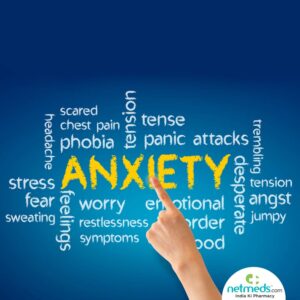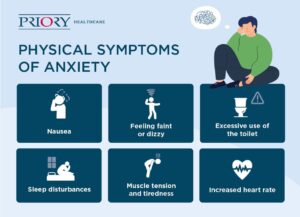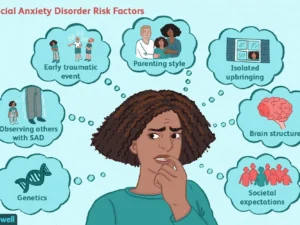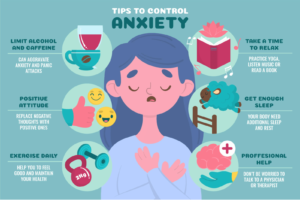How do you calm an anxiety?
Experiencing occasional anxiety is a normal part of life. However, people with anxiety disorders frequently have intense, excessive and persistent worry and fear about everyday situations. Often, anxiety disorders involve repeated episodes of sudden feelings of intense anxiety and fear or terror that reach a peak within minutes (panic attacks).

What is an anxiety disorder?
An anxiety disorder is a type of mental health condition. If you have an anxiety disorder, you may respond to certain things and situations with fear and dread. You may also experience physical signs of anxiety, such as a pounding heart and sweating.
It’s normal to have some anxiety. You may feel anxious or nervous if you have to tackle a problem at work, go to an interview, take a test or make an important decision. And anxiety can even be beneficial. For example, anxiety helps us notice dangerous situations and focuses our attention, so we stay safe.
But an anxiety disorder goes beyond the regular nervousness and slight fear you may feel from time to time. An anxiety disorder happens when:
- Anxiety interferes with your ability to function.
- You often overreact when something triggers your emotions.
- You can’t control your responses to situations.
Anxiety disorders can make it difficult to get through the day.
What symptoms anxiety patient show?
Common anxiety signs and symptoms include:
- Feeling nervous, restless or tense.
- Having a sense of impending danger, panic or doom.
- Having an increased heart rate.
- Breathing rapidly (hyperventilation).
- Sweating.
- Trembling.
- Feeling weak or tired.
- Trouble concentrating or thinking about anything other than the present worry.
- Having trouble sleeping.
- Experiencing gastrointestinal (GI) problems.
- Having difficulty controlling worry.
- Having the urge to avoid things that trigger anxiety.
Several types of anxiety disorders exist:
- Agoraphobia(ag-uh-ruh-FOE-be-uh) is a type of anxiety disorder in which you fear and often avoid places or situations that might cause you to panic and make you feel trapped, helpless or embarrassed.
- Anxiety disorder due to a medical condition includes symptoms of intense anxiety or panic that are directly caused by a physical health problem.
- Generalized anxiety disorder includes persistent and excessive anxiety and worry about activities or events — even ordinary, routine issues. The worry is out of proportion to the actual circumstance, is difficult to control and affects how you feel physically. It often occurs along with other anxiety disorders or depression.
- Panic disorder involves repeated episodes of sudden feelings of intense anxiety and fear or terror that reach a peak within minutes (panic attacks). You may have feelings of impending doom, shortness of breath, chest pain, or a rapid, fluttering or pounding heart (heart palpitations). These panic attacks may lead to worrying about them happening again or avoiding situations in which they’ve occurred.
- Specific phobias are characterized by major anxiety when you’re exposed to a specific object or situation and a desire to avoid it. Phobias provoke panic attacks in some people.
- Substance-induced anxiety disorder is characterized by symptoms of intense anxiety or panic that are a direct result of misusing drugs, taking medications, being exposed to a toxic substance or withdrawal from drugs.
- Separation anxiety disorder is a childhood disorder characterized by anxiety that’s excessive for the child’s developmental level and related to separation from parents or others who have parental roles.
- Social anxiety disorder (social phobia) involves high levels of anxiety, fear and avoidance of social situations due to feelings of embarrassment, self-consciousness and concern about being judged or viewed negatively by others.

When to see a doctor?
See your doctor if:
- You feel like you’re worrying too much and it’s interfering with your work, relationships or other parts of your life.
- Your fear, worry or anxiety is upsetting to you and difficult to control.
- You feel depressed, have trouble with alcohol or drug use, or have other mental health concerns along with anxiety.
- You think your anxiety could be linked to a physical health problem.
- You have suicidal thoughts or behaviors — if this is the case, seek emergency treatment immediately.
Your worries may not go away on their own, and they may get worse over time if you don’t seek help. See your doctor or a mental health provider before your anxiety gets worse. It’s easier to treat if you get help early.
What causes anxiety disorders?
Anxiety disorders are like other forms of mental illness. They don’t come from personal weakness, character flaws or problems with upbringing. But researchers don’t know exactly what causes anxiety disorders. They suspect a combination of factors plays a role:
- Chemical imbalance: Severe or long-lasting stress can change the chemical balance that controls your mood. Experiencing a lot of stress over a long period can lead to an anxiety disorder.
- Environmental factors: Experiencing a trauma might trigger an anxiety disorder, especially in someone who has inherited a higher risk to start.
- Heredity: Anxiety disorders tend to run in families. You may inherit them from one or both parents, like eye color.
What are the risk factors for anxiety?
- These factors may increase your risk of developing an anxiety disorder:
- Trauma. Children who endured abuse or trauma or witnessed traumatic events are at higher risk of developing an anxiety disorder at some point in life. Adults who experience a traumatic event also can develop anxiety disorders.
- Stress due to an illness. Having a health condition or serious illness can cause significant worry about issues such as your treatment and your future.
- Stress buildup. A big event or a buildup of smaller stressful life situations may trigger excessive anxiety — for example, a death in the family, work stress or ongoing worry about finances.
- Personality. People with certain personality types are more prone to anxiety disorders than others are.
- Other mental health disorders. People with other mental health disorders, such as depression, often also have an anxiety disorder.
- Having blood relatives with an anxiety disorder. Anxiety disorders can run in families.
- Drugs or alcohol. Drug or alcohol use or misuse or withdrawal can cause or worsen anxiety.

What are the complications of anxiety?
Having an anxiety disorder does more than make you worry. It can also lead to, or worsen, other mental and physical conditions, such as:
- Depression (which often occurs with an anxiety disorder) or other mental health disorders.
- Substance misuse.
- Trouble sleeping (insomnia).
- Digestive or bowel problems.
- Headaches and chronic pain.
- Social isolation.
- Problems functioning at school or work.
- Poor quality of life.
- Suicide.
Can anxiety disorders be prevented?
You can’t prevent anxiety disorders. But you can take steps to control or reduce your symptoms:
- Check out medications: Talk to a healthcare provider or pharmacist before taking over-the-counter medications or herbal remedies. Some of these contain chemicals that may make anxiety symptoms worse.
- Limit caffeine: Stop or limit caffeine you consume, including coffee, tea, cola and chocolate.
- Live a healthy lifestyle: Exercise regularly and eat a healthy, balanced diet.
- Seek help: Get counselling and support if you experienced a traumatic or disturbing event. Doing so can help prevent anxiety and other unpleasant feelings from disrupting your life.

How to treat anxiety?
The two main treatments for anxiety disorders are psychotherapy and medications. You may benefit most from a combination of the two. It may take some trial and error to discover which treatments work best for you.
Psychotherapy;
Also known as talk therapy or psychological counselling, psychotherapy involves working with a therapist to reduce your anxiety symptoms. It can be an effective treatment for anxiety.
Cognitive behavior therapy (CBT) is the most effective form of psychotherapy for anxiety disorders. Generally a short-term treatment, CBT focuses on teaching you specific skills to improve your symptoms and gradually return to the activities you’ve avoided because of anxiety.
CBT includes exposure therapy, in which you gradually encounter the object or situation that triggers your anxiety so you build confidence that you can manage the situation and anxiety symptoms.
Medications
Several types of medications are used to help relieve symptoms, depending on the type of anxiety disorder you have and whether you also have other mental or physical health issues. For example:
Certain antidepressants are also used to treat anxiety disorders.
An anti-anxiety medication called buspirone may be prescribed.
In limited circumstances, your doctor may prescribe other types of medications, such as sedatives, also called benzodiazepines, or beta blockers. These medications are for short-term relief of anxiety symptoms and are not intended to be used long term.
Talk with your doctor about benefits, risks and possible side effects of medications.

Author


